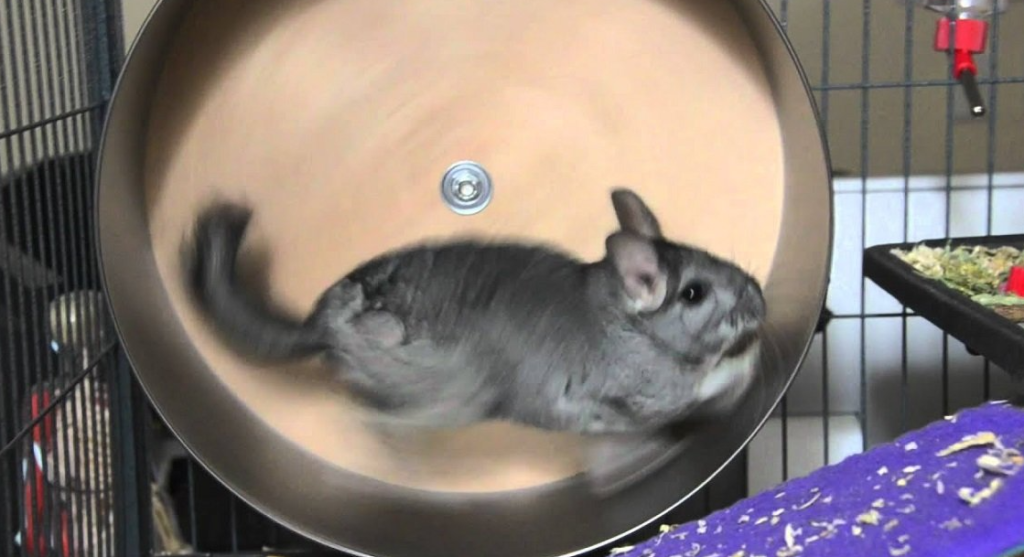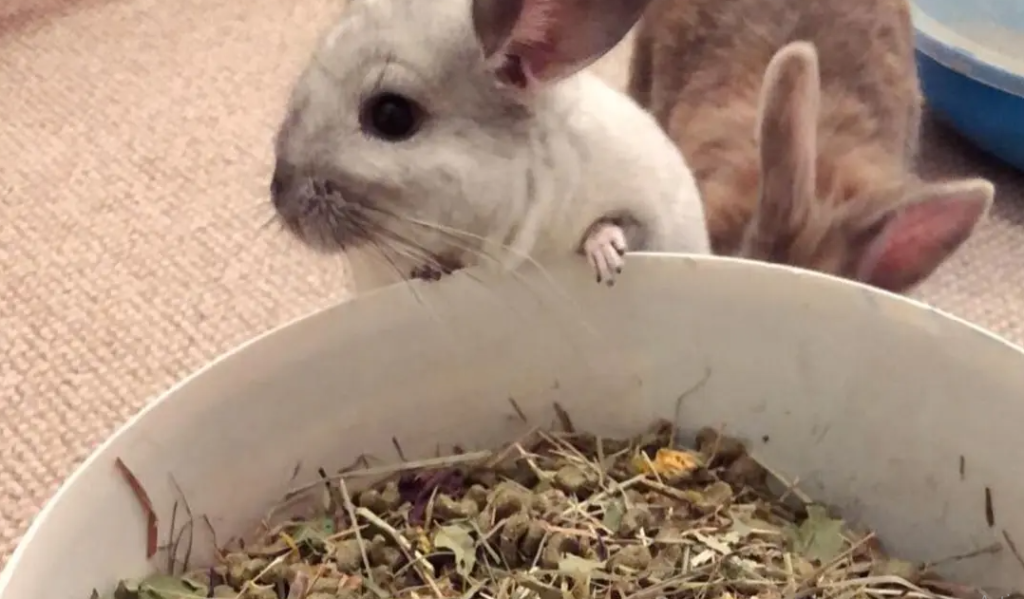Chinchillas are adorable and energetic small rodents, native to the Andes Mountains of South America. They have a reputation for being particularly active and playful animals. Due to their lively personalities, chinchillas may sometimes express anxiety or boredom by biting their cages as an outlet for pent-up energy.
Cage biting can be caused by numerous factors, such as stress, boredom, lack of exercise, or inadequate diets. To prevent this behavior from becoming a problem for your pet chinchilla, it is important to identify the underlying cause of its cage-biting habits and take steps to address that issue accordingly.
By understanding how various environmental factors can influence your chinchilla’s behavior and providing proper care and enrichment activities in order to meet its needs adequately you will be able help reduce any potential issues with cage-biting before they become too severe.
4 Possible Cause Of Cage Biting In Chinchilla
In this section, i will list 4 possible causes of cage biting in chinchilla, and how to help them overcome this unusual behavior:
- Stress
Stress is a common cause of cage-biting in chinchillas, and it’s important to be able to recognize the signs of stress in your pet. Signs that your chinchilla may be stressed can include pacing, aggression towards humans or other animals, excessive vocalizations, weight loss or gain and changes in eating habits.
If you notice any of these behaviors it’s important to try and determine what might be causing the stress and address it immediately. Common sources of stress for chinchillas can include loud noises, bright lights or sudden movements around their cages.
When left unchecked, chronic stress can lead to cage-biting as an outlet for pent up energy. In order to reduce this behavior from becoming a problem it is important that owners provide their pets with plenty of mental stimulation by introducing enriching activities into its environment such as providing new toys each day or rearranging furniture within their enclosure on occasion, so they have something new explore each day.

Additionally, providing ample opportunities for physical exercise via supervised playtime outside its cage will also help stimulate your pet mentally while helping burn off excess energy which could alleviate boredom related issues that might contribute towards cage-biting behaviors over time.
Finally, ensuring that you are giving your pet an appropriate diet with all necessary dietary requirements met will also help maintain optimal health while reducing instances where inadequate nutrition may lead to anxiousness which could potentially manifest itself through inappropriate biting behavior inside its enclosure over time.
- Boredom
In addition to stress, another common cause of cage-biting in chinchillas is boredom. When a pet chinchilla does not have adequate opportunities for mental and physical stimulation, it can become bored which may then lead to destructive behaviors such as cage-biting.
Signs that your pet may be suffering from boredom include excessive vocalizations or pacing around the enclosure, increased aggression towards humans or other animals and fidgeting when handled.
To help prevent this behavior from becoming a problem for your pet chinchilla it’s important to provide them with plenty of stimulating activities within their environment on a daily basis.
Adding new toys each day or rearranging furniture inside the enclosure will help keep things interesting while providing ample opportunities for physical exercise via supervised playtime outside its cage can also help keep boredom at bay over time.
Additionally, ensuring proper nutrition by feeding an appropriate diet with all necessary dietary requirements met will also help maintain optimal health while reducing instances where inadequate nutrition may lead to anxiousness which could potentially manifest itself through inappropriate biting behavior inside its enclosure over time
- Lack of Exercise
A lack of exercise can also be a contributing factor to cage-biting in chinchillas. Signs that your pet may not be getting enough exercise include reduced energy levels, weight gain or loss and changes in eating habits.
It is important to keep an eye out for these signs as they may indicate that your pet needs more physical stimulation than it’s currently receiving.

The main problem with a lack of exercise is that it can lead to pent up energy which could then manifest itself through destructive behaviors such as cage-biting.
This type of behavior typically occurs when animals are feeling bored or restless due to inadequate opportunities for physical activity and mental stimulation within their environment.
In order to help reduce issues related to this type of behavior, it’s important for owners to provide their pets with ample opportunities for both types of activities on a daily basis including supervised playtime outside its enclosure and introducing new toys each day or rearranging furniture inside the enclosure, so there are always fresh things for them explore and interact with regularly over time.
- Inadequate Diet
An inadequate diet is a common cause of cage-biting in chinchillas, and it’s important to be aware of the signs that could indicate your pet isn’t getting the nutrition it needs.
Signs that your chinchilla may not be receiving an adequate diet include weight loss or gain, changes in eating habits, hair loss, poor coat condition and lethargy. If you notice any of these behaviors it’s important to try and determine what might be causing the issue and address it immediately.

When left unchecked, an inadequate diet can lead to cage-biting as an outlet for pent up energy due to nutritional deficiencies.
In order to reduce this behavior from becoming a problem it is important that owners provide their pets with foods specifically designed for chinchillas containing all necessary vitamins and minerals needed for optimal health.
Additionally, providing fresh hay each day will also help meet your pet’s dietary requirements while helping stimulate its mind through exploratory playtime which could potentially alleviate boredom related issues contributing towards cage-biting over time.
Finally, supplementing meals with occasional healthy snacks such as fruits or vegetables will also add variety into its daily routine while helping ensure proper nutrition at all times which could prevent anxiousness caused by malnutrition from manifesting itself through destructive behaviors inside its enclosure over time.
Preventative Measures
Providing an appropriate diet is essential to helping reduce issues with cage-biting in chinchillas. It’s important that owners provide their pets with foods specifically designed for chinchillas containing all necessary vitamins and minerals needed for optimal health in order to prevent nutritional deficiencies from leading to anxiousness which could potentially manifest itself through inappropriate biting behavior inside its enclosure over time.
Additionally, providing fresh hay each day will also help meet your pet’s dietary requirements while helping stimulate its mind through exploratory playtime which could potentially alleviate boredom related issues contributing towards cage-biting over time.
Furthermore, supplementing meals with occasional healthy snacks such as fruits or vegetables will also add variety into its daily routine while helping ensure proper nutrition at all times which could prevent anxiousness caused by malnutrition from manifesting itself through destructive behaviors inside its enclosure over time.
Ensuring plenty of exercise is another key component in reducing instances of cage-biting in chinchillas. Providing ample opportunities for physical activities via supervised playtime outside the enclosure can help keep energy levels regulated while stimulating the animal both mentally and physically on a regular basis – reducing boredom related issues that may contribute towards this type of behavior if left unchecked.
Additionally, introducing new toys each day or rearranging furniture within their cages can also give them something new explore each day which could further reduce potential frustrations associated with being confined to one area long term..
Limiting stressful situations should be taken into account when attempting to reduce instances of cage-biting too – as stress is a common cause of this type of behavior amongst these animals.
Signs that your pet may be stressed can include pacing, aggression towards humans or other animals, excessive vocalizations, weight loss or gain and changes in eating habits so it’s important to try and determine what might be causing the stress and address it immediately if any signs are noticed before they become too severe. Common sources of stress for chinchillas can include loud noises, bright lights.
Conclusion
In conclusion, it’s important to understand the potential causes of cage-biting in chinchillas and take steps to reduce these behaviors. Providing an appropriate diet with all necessary dietary requirements met can help prevent nutritional deficiencies from leading to anxiousness which could potentially manifest itself through inappropriate biting behavior inside its enclosure over time.
